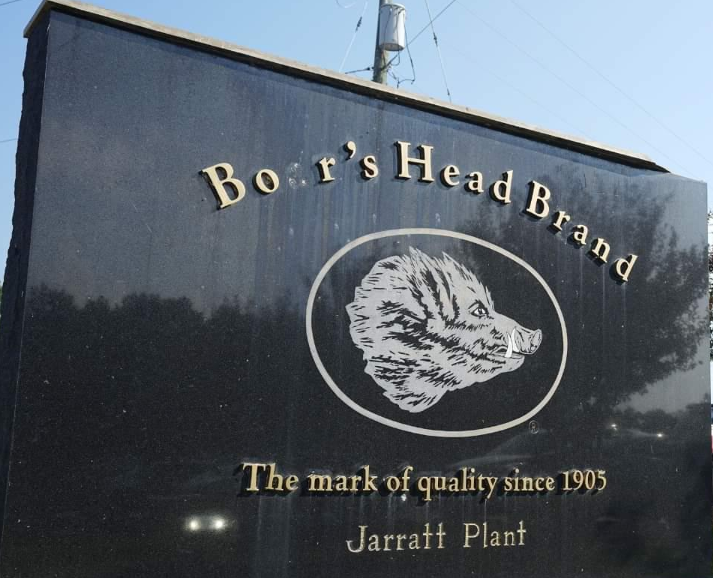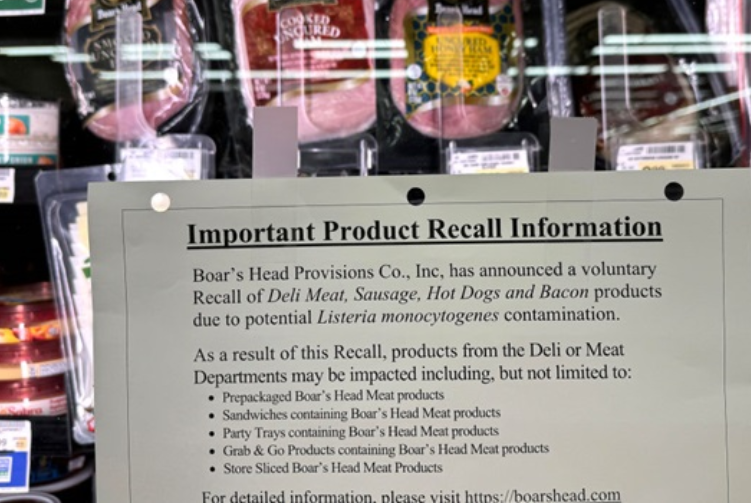Boar’s Head plans to reopen troubled deli meat plant, but reports of sanitation problems persist
Listeria in Boar’s Head Products
 The Listeria monocytogenes outbreak in the Boar’s Head product, which began in May of 2024 with a few isolated cases, quickly escalated in severity. By the time the CDC intervened, the outbreak had resulted in 60 hospitalizations and 10 fatalities, marking it as a significant public health concern. On July 12, 2024, FSIS initiated an investigation into a multistate outbreak of listeriosis linked to retail-sliced deli meats.
The Listeria monocytogenes outbreak in the Boar’s Head product, which began in May of 2024 with a few isolated cases, quickly escalated in severity. By the time the CDC intervened, the outbreak had resulted in 60 hospitalizations and 10 fatalities, marking it as a significant public health concern. On July 12, 2024, FSIS initiated an investigation into a multistate outbreak of listeriosis linked to retail-sliced deli meats.
The CDC (https://www.cdc.gov/listeria/outbreaks/details-delimeats-7-24.html) determined that the Listeria outbreak was indeed linked to deli meat sliced at the retail level. Boar’s Head issued a recall on July 30, 2024, for products produced at their Jarratt, Virginia, facility.
Over 2.6 million pounds of deli meat were destroyed from the Boar’s Head factory in Jarratt, Virginia. Ultimately, Boar’s Head recalled ~ 7 million additional pounds of ready-to-eat meat and poultry products. The expansion includes 71 products produced between May 10, 2024, and July 29, 2024, under the Boar’s Head and Old Country brand names. The products subject to recall were distributed to retail locations nationwide, and some were exported to the Cayman Islands, Dominican Republic, Mexico, and Panama.
Epidemiologic, laboratory, and traceback data showed that meats sliced at deli counters, including Boar’s Head brand liverwurst, were contaminated with Listeria monocytogenes and caused illness in people.
The CDC reported that as of November 19, 61 people were infected with the outbreak strain of Listeria. The outbreak included 19 states. Of 61 people with information available, 60 were hospitalized. One person got sick during their pregnancy and remained pregnant after recovering. Ten people were dead. Death occurred in Illinois (1), New Jersey (1), New York (2), Virginia (1), Florida (1), Tennessee (1), New Mexico (1), and South Carolina (2).
In July 2024, Boar’s Head recalled all deli products made at the Jarratt, VA facility, which included prepackaged deli products and ready-to-eat liverwurst products, because they were contaminated with Listeria monocytogenes. These products have a past shelf life. https://www.cdc.gov/listeria/outbreaks/details-delimeats-7-24.html
WGS results show that a liverwurst sample collected by the Maryland Department of Health tested positive for the outbreak strain of Listeria monocytogenes. On July 26, 2025, the USDA/FSIS reported that Boar’s Head Provisions Co., Inc. (Jarratt, VA) is recalling ~ 207,528 pounds of product.

The products were produced between June 11, 2024, and July 17, 2024, and have a 44-day shelf life. The products subject to recall were distributed to retail deli locations nationwide. The problem was discovered when FSIS was notified that a sample collected by the Maryland Department of Health tested positive for L. monocytogenes. FSIS is working with the CDC and state public health partners to investigate the multistate outbreak of L. monocytogenes infections linked to meats sliced at delis. As of July 25, 2024, 34 sick people have been identified in 13 states, including 33 hospitalizations and two deaths. https://www.fsis.usda.gov/recalls-alerts/boars-head-provisions-co–recalls-ready-eat-liverwurst-and-other-deli-meat-products
As of September 2024, the CDC updated the number of victims in the Listeria monocytogenes outbreak. The outbreak has 59 cases, 59 hospitalizations, and 10 deaths in 19 states. The rate of detection of new cases had slowed down. Epidemiologic, laboratory, and traceback data showed that meats sliced at delis, including Boar’s Head brand liverwurst, were contaminated with Listeria and caused illness in people. Products sold at the deli, especially those that are sliced or prepared on-site, can be contaminated with Listeria. Listeria spreads quickly among deli equipment, surfaces, hands, and food.
On September 13, 2024, Boar’s Head closed its Jarratt plant, and the company announced it would discontinue making any liverwurst products. The outbreak lasted from July through November 2024. It was the largest outbreak of the foodborne bacterial illness since 2011. The CDC declared the outbreak over on November 21, 2025.
The problems in the Boar’s Head Facility
As part of the investigation into the issues in the Jared facility, the FSIS reviewed inspection documents and sampling data from January 2022 to September 2024. As a result, the FSIS identified several issues that may have contributed to the outbreak. A significant factor was inadequate sanitation practices.
Documented instances of noncompliance included:
- Product Residue: Inspectors identified the presence of meat and fat residue from the previous production day on the equipment, allowing the formation of biofilms and substrates for the growth of Listeria.
Blocked drains: meat and other debris clog the drain, contributing to unsanitary conditions. - Condensation: inspectors identified condensation in the Ready-to-Eat (RTE) environment
- Employee hygiene: failure of employees to wear aprons, helmets, and wash their hands, contributing to unsanitary conditions.
- Structural and facility problems: including cracks on the floor, holes, and broken floors that contributed to wet conditions.
- Molds and mildew were found in the plant near sinks and coolers.
- Lack of proper cleaning: general filth indicates inappropriate cleaning.
Also, the inspectors documented rust, beaded condensation, and peeling caulk. These findings necessitated temporarily closing the Jarratt operation and raised concerns about the company’s commitment to food safety. The FSIS required correction action, including new measures of food safety and employee training.
The issues identified during the inspection at the Jared facility are not isolated incidents. Similar problems were also found in other Boars Head facilities, including those in New Castle (Indiana), Forrest City (Arkansas), and Petersburg (Virginia). These systematic issues contributed to the Listeria outbreak, highlighting the need for company wide changes.
Reopening the Boar Head facilities
The Associated Press (AP) reported that the Boar’s Head deli meat plant at the center of the deadly food outbreak is scheduled to reopen in the coming months. But recent inspections at Boar’s Head sites in three states documented sanitation problems similar to those that led to the Listeria outbreak. However, the USDA officials said they had “thoroughly reviewed” the plant and lifted the forced suspension on July 18.
AP reported that “The facility is in full compliance with the guidelines and protocols set for the safe handling and production of food and the serious issues that led to suspension have been fully rectified,” officials with the USDA’s FSIS said in an email.
However, documents obtained by the AP (https://www.documentcloud.org/documents/26044154-fsis-bh-records/) through a freedom of information request show that Boar’s Head plants in Arkansas, Indiana, and elsewhere in Virginia were flagged for the same kinds of sanitation problems that led to the outbreak and closure of the facility in Jarrett, with the most recent report in June. These ongoing issues are a cause for concern.
AP reported that in the past seven months, government inspectors reported problems similar to those encountered before the closing. The records, which included USDA noncompliance reports logged by inspectors from January 1 through July 23, raise new questions about the company’s promises to address systemic problems and about federal oversight of Listeria contamination in plants that make ready-to-eat foods.
“If there is evidence that food safety problems are continuing, the government needs to make sure the company fixes them,” said Sandra Eskin, a former USDA official who now heads STOP Foodborne Illness, a consumer group focused on food safety.
Boar Head convened a panel of expert advisers last fall and hired a chief food safety officer in May. The advisers include Frank Yiannas and Mindy Brashears, President Donald Trump’s nominee for USDA’s undersecretary for food safety.
The company officials refused to discuss the problems found this year. They canceled a scheduled AP interview with Natalie Dyenson, the new food safety officer. And they declined to allow Yiannas to detail the investigation he led into the contamination’s cause. This lack of transparency is concerning.
A statement by the company said, “We have also been working with the USDA in developing a plan to reopen our Jarratt facility in a measured, deliberate way in the coming months,” “You would have expected, after all they went through, that they would put themselves in a place where you could essentially eat deli meat off the factory floor,” said Brian Ronholm, director of food policy for Consumer Reports, an advocacy group. Rep. Rosa DeLauro called the current findings in the plant “appalling.”
The reports point to a “food safety culture problem,” said Barbara Kowalcyk, who directs a food safety and nutrition security center at George Washington University. “What jumped out to me is there is an organizational culture issue that needs to be changed,” she said. “Usually that culture has to start at the top.” “I think they need to be aware that there are issues at this organization that still are not completely under control, apparently,” Kowalcyk said.
Boar’s Head faced multiple lawsuits from people who fell ill or from the families of those who died. Several survivors declined to comment publicly on the new problems, citing financial settlements with the company that included a nondisclosure agreement. As a result, it was just announced that federal officials will assume direct oversight of the inspections in the Jarett facility.

One response to “Boar’s Head plans to reopen troubled deli meat plant, but reports of sanitation problems persist”
The Meatingplace (https://www.meatingplace.com/Industry/News/Details/120307) reported that the Jarratt facility, which was previously inspected by the Virginia Department of Agriculture and Consumer Services’ (VDACS) Office of Meat and Poultry Services (OMPS) in a cooperative arrangement with USDA, will now be under direct oversight from the Food Safety and Inspection Service. “Once it resumes operations, the Jarratt establishment will be operating under an enhanced verification plan for at least 90 days, which will be overseen directly by FSIS inspectors and will include intensified Listeria sampling and heightened monitoring to ensure the establishment consistently and effectively implements its corrected food safety plans,” USDA said in written response. ”Lapses could result in further intensified sampling and/or enforcement actions.”